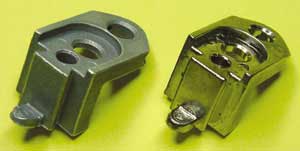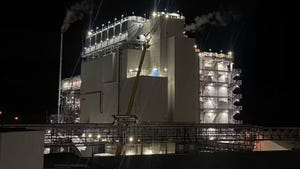Injection molding aluminum
May 1, 2002
|
Figure 1. Advanced Materials Technologies of Singapore has developed a process for the high-volume powder injection molding of complex, tight-tolerance parts in aluminum. Here, an aluminum sample (left) is compared to one molded of stainless steel. |
In early March 2002, a custom molder successfully demonstrated the powder injection molding (PIM) of aluminum. Part densities exceeded 95 percent. The molder, Advanced Materials Technologies (AMT, Singapore), has filed a trademark for its proprietary aluminum metal injection molding (MIM) process as "aluMIM." Company sources say they hope to start commercial production by early next year.
Aluminum and its alloys are widely used in a number of markets, including automotive, electronics, and aerospace. Its excellent thermal conductivity and strength-to-weight properties make it the material of choice for many applications.
But conventional methods of manufacturing aluminum parts like casting and pressing leave a lot to be desired, according to AMT officials, especially when it comes to part mechanical properties and design freedom. They believe that their aluMIM process will bring to aluminum the same cost-effective benefits that PIM has brought to a number of other popularly used metals and ceramics.
AMT specializes in MIM and ceramic injection molding (CIM) and has been a pioneer in expanding the horizons of the PIM process for more than a decade. For example, just last year reports surfaced that AMT had molded a consolidated magnetic, nonmagnetic metal part on a twin-barreled Arburg press (see "A Multimetal Molding Machine," April 2001 IMMC, p. 25). Mass-producing aluMIM parts of consistent quality is its latest frontier.
Chained Reaction
Lye King Tan, AMT's senior technology manager, says aluminum's temperamental and volatile nature poses a number of challenges. "Finding suppliers of aluminum powders is not an issue. However, the reactive nature of aluminum is. We must address the issue of creating a controlled environment for working with this material."
Tan says special handling procedures are being fine tuned to prevent the possibility of aluminum being exposed to air. "We make our own proprietary binder system and coat the powders."
Tan also says no special materials of construction are required either for injection units or molds. "Feedstock preparation requires some attention. Sintering may be even more important. Once our coatings have been removed in the debinding process special attention has to be paid to controlling our sintering furnaces. This is where much of our proprietary technology comes into play."
An immediate target market in AMT's sights is in heat sinks. "Because of the grain structure of the aluminum powders we use, aluMIM heat sinks will function much more effectively than those that are diecast," Tan explains. "We also have a better ability to make tight-tolerance parts. Additionally, there is less flash and far fewer secondaries are involved, so manufacturing costs are reduced. I believe aluMIM will be very competitive, especially when it comes to producing complex parts."
Contact information |
You May Also Like



